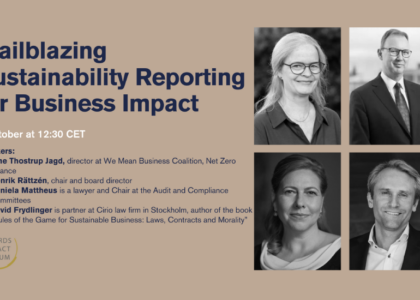Corporate Boards find themselves in a swirl wind of changes and have to balance a set of dilemmas in adjusting business strategy and business models to Sustainability and Artificial Intelligence.
Boards need to consider and handle dilemmas as
- Balancing Short-Term Profitability with Long-Term Sustainability: Corporate boards often face the dilemma of prioritizing short-term financial gains over long-term sustainability objectives. Integrating sustainability into business strategy may require upfront investments, restructuring operations, or sacrificing immediate profits for the sake of long-term environmental or social goals. Boards must navigate this tension and make decisions that strike a balance between financial performance and sustainable practices.
“Board governance of sustainability involves three distinct areas. The most basic area is sustainability hygiene, which involves attention to sustainability-related matters including reporting, sustainability initiatives, data and stakeholder engagement. The next area of governance is controls and practices, which covers oversight of how the company is adopting controls and best practices to ensure the integrity of its sustainability journey. Finally, strategic reflection and implications is where boards should be focusing most of their time.“
Boards needs to take active leadership in shaping their business and sustainability governance, as shared in an INSEAD Knowledge article by Ron Soonius, Director in Residence at INSEAD Corporate Governance Centre
- Trade-off between automation efficiency and human-centric sustainability. AI technologies offer the potential to optimize operations, increase efficiency, and reduce environmental impact. By automating processes, AI can streamline resource utilization, minimize waste, and enhance sustainability performance. However, this automation efficiency can come at the expense of human-centric sustainability considerations. Boards must make decisions that consider the benefit of AI innovation and value creation for the company and their customers, and minimize the potential ethical issues and negative impacts on employees, communities, and social well-being.

- Managing Stakeholder Expectations: Companies have diverse stakeholders, including shareholders, employees, customers, communities, and regulatory bodies. Each group may have different expectations regarding sustainability practices. Corporate boards must grapple with the challenge of aligning these varying expectations and determining which stakeholders to prioritize. For example, shareholders may focus on financial returns, while customers may value environmentally friendly products. Boards must make decisions that consider the interests of multiple stakeholders, while ensuring the organization’s sustainability commitments are met.
- Overcoming Resistance to Change: Integrating sustainability into business strategy often requires significant changes in organizational processes, culture, and mindset. However, resistance to change can emerge from employees, executives, or other key decision-makers within the company. Corporate boards must address this resistance by fostering a culture of sustainability, communicating the importance of sustainable practices, and providing the necessary resources and incentives to drive the desired changes. Boards must balance the pace of change with the need for immediate action.
- Trade-offs between Different Business and Sustainability Goals: Sustainability is a complex and multifaceted concept that encompasses environmental, social, and economic dimensions. Boards may need to prioritize and make trade-offs between these different sustainability goals. For instance, a company may face a dilemma when deciding between investing in renewable energy sources to reduce its carbon footprint or allocating resources toward improving labor conditions in its supply chain. Boards must carefully evaluate these trade-offs and make decisions that align with the organization’s values, stakeholder expectations, and long-term sustainability vision.
“Firms have an important role to play in fixing the world’s problems. Not least because they are often the cause of those problems. More pragmatically, they need to act because their operations are also being impacted, through supply chain issues, raw material scarcity or environmental challenges, for example.”
“Companies often face a dilemma between delivering real sustainability impact and gauging if being more sustainable is financially viable. To help with this assessment INSEAD Professor N Craig Smith has developed a sustainability-business case matrix. This examines the trade-offs companies are making in seeking real and meaningful impact. On the vertical axis is the certainty of the business case: What is the likelihood, amount and time horizon of financial payback from a given option? On the horizontal axis is the sustainability of the option: How much real impact is the action really going to make? “

Companies need to take risks if they want truly impactful results, as shared in an INSEAD Knowledge article by Professor N. Craig Smith
- Ensuring Transparency and Accountability: Corporate boards face the challenge of ensuring transparency and accountability in sustainability reporting and performance. They must consider how to effectively measure, monitor, and communicate the company’s sustainability progress and impacts. Boards must navigate dilemmas related to setting meaningful metrics, avoiding greenwashing practices, and providing accurate and reliable information to stakeholders. Boards must strike the right balance between disclosing sensitive data and maintaining competitive advantage when promoting transparency and accountability in sustainability integration.
These dilemmas highlight the complex decisions and trade-offs that corporate boards must address and by actively engaging with these challenges, boards can drive positive change and enhance the long-term viability and resilience of the organizations they govern.
Webinars, Peer Exchanges and Programs
Boards Impact Forum with partners are focused on supporting board members in understanding how to handle these dilemmas by sharing insights and arranging peer exchanges and programs.

Welcome to join:
a series of Webinars and Peer Exchanges on board dilemmas related to the boards role and activities in guiding sustainability integration in business strategy incl
- Nov 10 Boards Guidance of AI for Sustainability
- Nov 22 Boards Accountability, Competence and Processes
- Dec 7 Risk Opportunity and Strategic Integration
- Jan 9 Incentivization, Reporting & Disclosure and Stakeholder Exchange
all held 8-9.30 CET, free of charge, requiring a board mandate. Find all here https://boardsimpactforum.com/events-bif/
a related Online and Virtual program on Board Oversight of Sustainability for Value Creation Nov 21 – Jan 31, based on the WEF Principles with Certification, already taken by several IDN Members
and an Online & Virtual program on Artificial Intelligence for Boards Jan 12 – Mar 12, based on academic research in collaboration with the Wallenberg Companies, INSEAD, Royal Institute of Technology et al
All arranged by Boards Impact Forum in collaboration with World Economic Forum (Non Profit Board Network partnering with Board Networks , INSEAD Corporate Governance Centre and Nordic INSEAD IN-Board Academy)
About Boards Impact Forum








Recent Comments